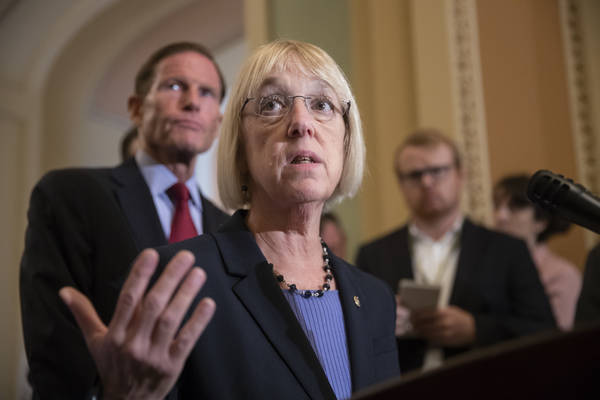Senate GOP breaks century-old tradition for circuit court nominees

WASHINGTON — Senate Republicans abandoned a century-old tradition and confirmed a circuit court appointee without the support of both home-state senators, a break in precedent that a Nevada senator said diminishes the prerogative of states in the judicial selection process.
The GOP-controlled Senate last week confirmed presidential appointee Eric Miller to the 9th U.S. Circuit Court of Appeals over the objection of Democratic home-state Sens. Patty Murray and Maria Cantwell of Washington, who opposed him because of previous rulings on tribal sovereignty issues.
It was the first time in over 100 years that the Senate broke with the tradition and ignored objections of both home-state senators in a process commonly known as the “blue slip.”
Miller was confirmed along a straight party-line vote, 53-46. Sen. Kyrsten Sinema, D-Ariz., did not vote.
The enormity of the action was not lost on Nevada’s two Democratic senators.
Nevada is in the 9th Circuit and currently has two federal district bench vacancies, with appointees yet to be nominated by President Donald Trump.
Sen. Catherine Cortez Masto, D-Nev., took the Senate floor to denounce the rule change and criticized Republican leaders for a decision that circumvented the Senate role of advice and consent on judicial appointments.
Cortez Masto said the former process was put in place to “ensure every senator has a voice in the selection of judges in their home state.”
“Republican leaders are circumventing senators, ignoring the people we were elected to represent and damaging our critical role in appropriately deliberating on lifetime judicial nominees,” she said.
“This is a dereliction of the Senate’s duty and an assault on our institution,” Cortez Masto added.
Backlog of vacancies
The San Francisco-based court of appeals serves nine Western states, including Nevada, along with Guam.
The circuit has the largest number of judges appointed by Democratic presidents and is a frequent target of Trump, who has claimed a liberal bias of district judges following recent rulings that have blocked his policies from being enacted.
Senate Majority Leader Mitch McConnell, R-Ky., who has made judicial appointments a high priority, changed Senate rules by dropping the 60-vote threshold to end debate and confirm Supreme Court justices. Two Trump nominees to the high court have been confirmed as a result.
McConnell also muscled 31 circuit court judges through the Senate since 2017, including Miller.
There is a huge backlog of vacancies on federal district benches nationwide, including the two in Nevada — one considered an emergency because it has remained open for more than three years.
The backlog stems partly from Republican opposition to nominations by President Barack Obama, including his pick of Merrick Garland to fill the Supreme Court seat that came open when Justice Antonin Scalia died in 2016.
The first current federal bench vacancy in Nevada came about in 2016 when Judge Robert Clive Jones took senior status. Obama nominated Anne Rachel Traum, a UNLV law professor, to fill the vacancy. That nomination was blocked by former Sen. Dean Heller, R-Nev.
The second Nevada vacancy occurred in June when Judge James Mahan took senior status.
Changes in Senate rules on judicial nominations began in 2013 when then-Senate Majority Leader Harry Reid, D-Nev., lowered the 60-vote threshold to close debate and vote on judicial nominees, though not Supreme Court justices.
McConnell then changed the threshold in 2017 to confirm Justice Neil Gorsuch to the high court.
100-year-old tradition
The tradition of senators having a prerogative on judicial nominations from their home state has been a Senate tradition throughout the past century.
Senators had the authority to withhold or return a negative “blue slip” that would block a hearing or confirmation. The process dates back to 1917, according to the Congressional Research Service.
“It goes back a hundred years,” said Carl Tobias, the Williams Chair in Law at the University of Richmond School of Law. “It’s a huge deal. It’s very important because the circuit courts are the supreme courts for 99 percent of cases.”
The break from tradition came under former Senate Judiciary Committee Chairman Charles Grassley, R-Iowa, and was prompted by Democratic senators’ opposition to nominees, Tobias said.
“The GOP chose to make an exception for appellate vacancies,” said Tobias, a founding faculty member of the Boyd Law School at UNLV.
But current Senate Judiciary Chairman Lindsey Graham, R-S.C., has said he will honor the process of favorable or unfavorable “blue slips” from home-state senators on nominations for federal district benches.
Still, the GOP action the past week was “a first,” according to Murray, who along with Cantwell opposed the Miller nomination because of his previous legal work against American tribal sovereignty.
Miller acknowledged his past case work, but said he was an advocate for his clients. He told the Judiciary Committee that as a judge he would be neutral in applying the law.
Murray and Cantwell disagreed, as did Oregon senators and Cortez Masto.
“He is the wrong candidate to fill this judicial seat,” said Cortez Masto, who added that the confirmation could have serious consequences for tribes in Nevada and other states.
Although Miller is the first appeals court judge to be appointed without support of both home-state senators, Trump’s nomination of Ryan Bounds of Oregon to serve on the 9th Circuit Court of Appeals in 2017 was opposed by both Democratic senators from that state.
The Bounds nomination was later withdrawn when it was revealed that he made remarks in college that were racially insensitive.
The changes implemented by the GOP leaders in the Senate could backfire if Democrats retake control of the Senate, Tobias said. Regardless of party, it takes away the power of the states to diligently select someone who reflects local culture.
“The home-state senators should have say in who sits on circuit courts in their jurisdictions,” Tobias said.
Contact Gary Martin at gmartin@reviewjournal.com or 202-662-7390. Follow @garymartindc on Twitter.